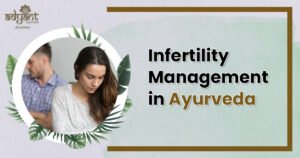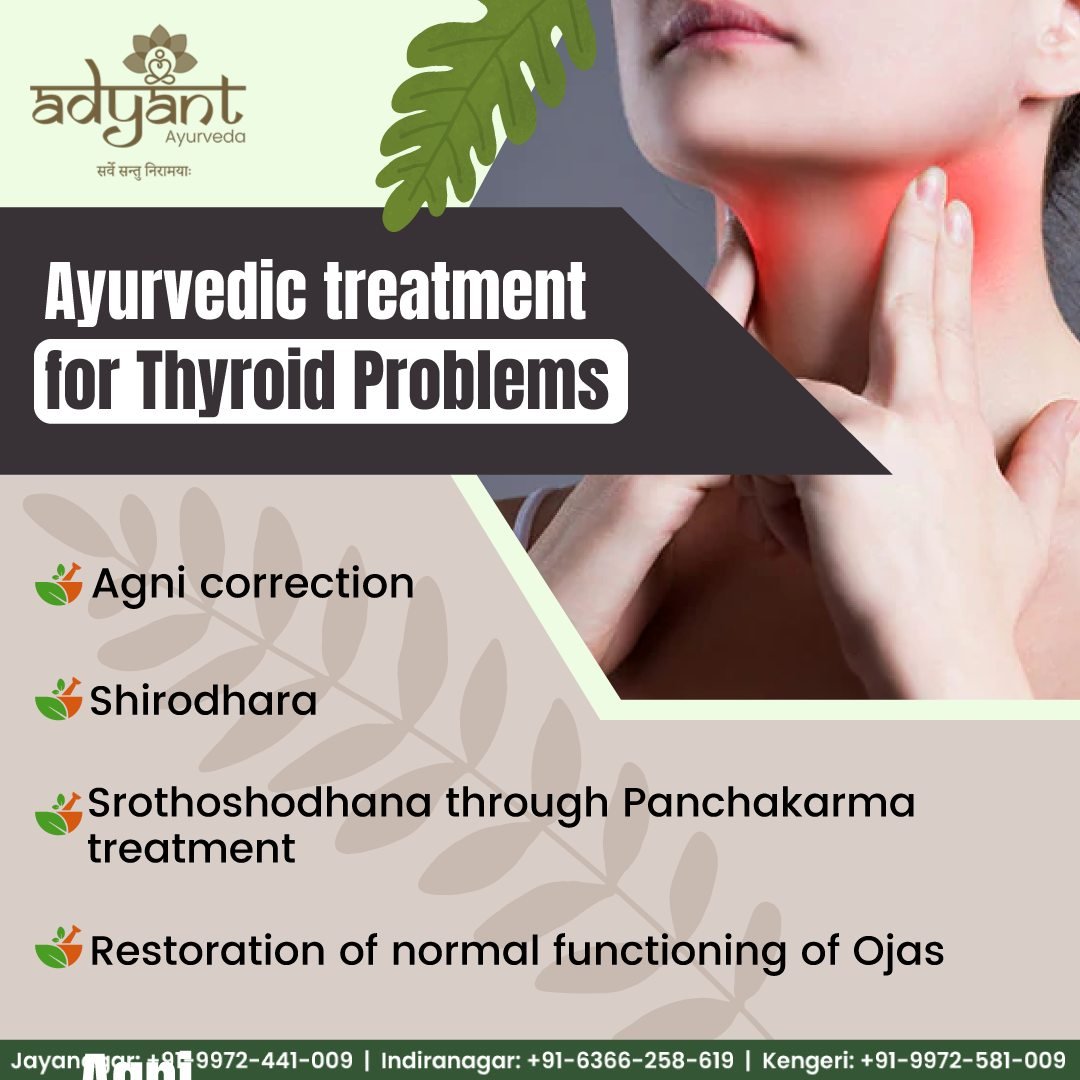Table of Contents
ToggleAyurveda for PCOD
Poly Cystic Ovarian Disease (PCOD) is the most common endocrinopathy in women of reproductive age, resulting from insulin resistance and compensatory hyperinsulinemia. This imbalance affects the ovaries leading to the formation of small cysts. These are a few signs and symptoms associated with the condition- PCOD. Here will discuss Ayurveda treatment for PCOD, before will understand what is PCOD?
What is PCOD ?
A hormonal disorder causing enlarged ovaries with small cysts on the outer edges. It Is a hormonal imbalance This imbalance affects the ovaries leading to the formation of small cysts.
Poly Cystic Ovarian Syndrome is a relatively common endocrine disorder in women of reproductive age group.
Symptoms of PCOD
Some common symptoms of PCOD include
- Weight gain
- Irregular menstrual cycle,
- Facial hair growth, male pattern baldness,
- Acne which refuses to heal, pigmentation around the neck region and infertility.
- Darkening of the skin. Dark patches of skin can form in body creases like those on the neck, in the groin, and under the breasts.
- Hormone changes can trigger headaches in some women.
Causes of PCOD
The cause of PCOS is still unknown. However, it is possible to find the association of PCOS with low grade inflammation, excess insulin, high male hormone production (hyperandrogenism) and genetics. In addition, the early age of menarche, an unhealthy lifestyle and pollution are some of the factors that contribute to PCOS.
Complications of PCOD can include:
- Infertility
- Gestational diabetes or pregnancy-induced high blood pressure
- Miscarriage or premature birth
- Non-alcoholic steatohepatitis — a severe liver inflammation caused by fat accumulation in the liver
- Metabolic syndrome — a cluster of conditions including high blood pressure, high blood sugar, and abnormal cholesterol or triglyceride levels that significantly increase your risk of cardiovascular disease
Awareness regarding PCOD at an early stage will help to avoid future implications. Unhealthy lifestyles, stress, and excessive consumption of junk foods are some factors that need to be addressed.
Ayurvedic herbs to treat PCOD/ Ayurvedic medicines for PCOD
Ayurvedic herbs work on symptoms occurred due to Polycystic Ovarian Syndrome. The benefits of taking Ayurvedic medicines for
Polycystic Ovarian Syndrome are
1) Helps to reduce weight
2) Improve metabolic rate
3) Helps to correct hormonal imbalance
4) Helps to maintain cholesterol levels.
But its always advisable to take any medication under the guideline of an Ayurveda Physician at Adyant Ayurveda Best Ayurveda doctor in Bangalore
1) Shatavari: Helps to balance hormones and maintain the ovarian plexus. Prevents the formation of new cysts and also prevents remission of the disease
2) Kanchnar Guggulu: helps to remove toxins and wastes from the system and improves metabolism.
3) Bilva: Bilva is immensely rich in essential nutrients and bioactive compounds that help reduce the size of cysts
4) Gudichi: has a rejuvenating effect, corrects hormonal imbalance, reduces inflammation, supports weight loss and regulates blood loss. menstrual cycle
5) Punarnava: Helps in the production of reproductive hormones in women and corrects hormonal problems. It is known to increase blood circulation, improve insulin resistance, and cure PCOD
Diet for PCOD
There are a few things you can do to help manage your PCOD. First, make sure you are eating a balanced diet. Include plenty of fruits and vegetables as well as whole grains. Second, make sure you are getting enough exercise. A healthy body weight and regular exercise can help to control PCOD. Finally, make sure you are using medications as prescribed by your doctor.
- Eat Plenty of Fiber
Fiber is important for all of us, but it’s especially important for women with PCOS. That’s because fiber can help regulate blood sugar levels, which can be a big issue for women with PCOS.Aim for at least 25 grams of fiber per day. Good sources of fiber include beans, legumes, whole grains, and vegetables.
- Avoid Refined Carbs
Refined carbs are those that have been processed and had the fiber and other nutrients removed.
3.The first step is to focus on eating real, whole foods. This means choosing foods that are minimally processed and free of artificial ingredients.
4.Whole foods include fruits, vegetables, whole grains, lean proteins, and healthy fats.
Aim to fill your diet with plenty of nutrient-rich foods like fruits and vegetables. These foods are packed with vitamins, minerals, and fiber that can help support your health.
Whole grains are another important part of a healthy diet for PCOD. Choose whole grain breads, pastas, and cereals over their refined counterparts.
Lean proteins are an important part of a PCOD diet. Choose lean meats, poultry, and fish, or get your protein from plant-
Ayurveda treatment for PCOD / can PCOD be cured permanently?
several people ask question can PCOD be cured permanently with Ayurveda treatment ?
The Answer is Yes, it involve Ayurveda medicines, Ayurveda treatments, dietary changes, and lifestyle changes along with proper exercises to cure PCOD permanently with Ayurveda
A multidisciplinary approach is planned wherein a healthy diet to correct metabolism, lifestyle changes, relieving stress factors along with medications are advised.
Ayurveda emphasizes Shodhana or Panchakarma therapies like Vamana, Virechana, Basti and internal medications are the key treatments planned to tackle PCOD.
How Panchakarma treatment helps to treat PCOD ?
Panchakarmais a traditional Ayurvedic therapy that focuses on detoxifying and balancing the body’s energies (doshas). Panchakarma treatments potentially helps to manage the condition by addressing some of its underlying causes and associated symptoms. Here’s how Panchakarma treatment may assist in the management of PCOD:
Detoxification: Panchakarma includes various cleansing procedures that aim to remove accumulated toxins (ama) from the body.
PCOD is believed to be linked to hormonal imbalances, and detoxification can help improve metabolic processes and hormone balance.
Hormone Regulation: Ayurvedic herbs and therapies used in Panchakarma, such as Shatavari and Ashwagandha, are known for their
potential to regulate hormones. Hormonal imbalance is a significant factor in PCOD, and Ayurvedic treatments may help restore hormonal equilibrium.
Stress Reduction: PCOD is often associated with stress, which can worsen symptoms. Panchakarma incorporates relaxation techniques, such as Abhyanga (oil massage) and Shirodhara (oil poured over the
forehead), to reduce stress and anxiety.
Diet and Lifestyle Guidance: Ayurvedic practitioners typically provide personalized dietary and lifestyle recommendations. These suggestions
can help individuals with PCOD make healthier choices, which may positively impact their condition.
Weight Management: Many women with PCOD struggle with
weight management. Panchakarma treatments may include dietary modifications and therapies to support weight management, which is important for PCOD management.
Improved Digestion: Panchakarma can enhance digestive
function, which is essential for nutrient absorption and overall health.
Improved digestion can contribute to better management of PCOD symptoms.
Which Panchakarma treatments good to treat PCOD
Vamana, Virechana, and Basti are three Panchakarma therapies used in Ayurveda to treat PCOD. They can be part of a comprehensive treatment approach for PCOD .Here’s how each of these therapies may help treat PCOD:
Vamana (Emesis Therapy):
Detoxification: Vamana is primarily a detoxification procedure that helps remove excess Kapha dosha from the body. In PCOD, elevated Kapha dosha can contribute to weight gain, insulin resistance,and hormonal imbalances.
Hormonal Balance: By reducing Kapha dosha, Vamana may help regulate hormones associated with PCOD, such as insulin and androgens
(male hormones). Improved hormonal balance can alleviate some PCOD symptoms.
Weight Management: Vamana can support weight loss,which is often recommended for individuals with PCOD to improve insulin
sensitivity and reduce the severity of symptoms.
Virechana (Purgation Therapy):
Detoxification: Virechana is primarily aimed at eliminating excess Pitta dosha and toxins from the body. In PCOD, an accumulation of Pitta can lead to inflammation and hormonal disruptions.
Liver Health: Virechana can help cleanse and rejuvenate the liver, which is essential for hormone metabolism. A healthy liver can better metabolize hormones and reduce PCOD symptoms.
Digestive Balance: Improved digestion and elimination resulting from Virechana can indirectly support hormonal balance by reducing
toxin buildup and inflammation.
Basti (Enema Therapy):
Hormonal Balance: Basti, especially Niruha Basti (decoction enema), can help balance Vata dosha, which is often disturbed in PCOD. Regulating Vata can have a positive impact on hormone regulation.
Gynecological Health: Basti treatments may focus on the lower abdomen and pelvic area, promoting better circulation and reducing pain
associated with PCOD.
Digestive and Metabolic Support: Basti can improve overall digestion
and metabolism, which are crucial for addressing insulin resistance and weight management in PCOD.
OVERVIEW
PCOD is a common hormonal disorder that affects women of reproductive age. In Ayurvedic medicine, PCOD is believed to be caused by an imbalance of the doshas, specifically an increase in kapha and a decrease in pitta.
Treatments for PCOD may include a combination of herbal remedies, Panchakarma treatments, yoga, and dietary changes.
Herbal remedies commonly used for PCOD include Shankhapushpi, Guduchi, and Licorice, which are believed to help balance hormones and regulate the menstrual cycle.
Panchakarma treatments, particularly with warm herbal oils, may be used to help reduce stress and improve blood flow to the reproductive organs.
Yoga and breathing exercises may also be recommended to help improve circulation and to manage stress, which is believed to aggravate the symptoms of PCOD.
Dietary changes may also be recommended, such as the avoidance of processed foods, sugar, and caffeine and increasing the intake of vegetables, fruits, and whole grains.
Consult best Ayurveda doctor for PCOD at Adyant Ayurveda to know more about Ayurveda for PCOD
For more details visit www.adyantayurveda.com or call +91 9972541009






